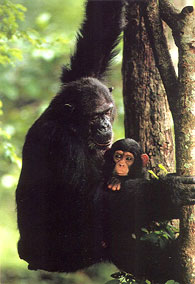
Mother with infant chimpanzee, names unknown, living free.
Photo: © Michael Nichols from Brutal Kinship (Aperture)
Thus, by this ingenious research we learned what had been totally obvious to everyone else, except psychologists, for centuries.
— Harry Harlow, PhD
Former head of the Primate Research Center at the University of Wisconsin, referred to as “the Dean of Primate Research”
Psychological research includes a shocking history and continuation of maternal deprivation experiments on animals. While maternal deprivation experiments have been conducted far more frequently on rhesus macaques and other monkeys, chimpanzees were not spared as victims of this unnecessary research.
Psychologists like the infamous Harry Harlow inflicted unimaginable emotional suffering on hundreds of primates by separating them from their mothers at various early ages.
After separating infants from their mothers, researchers like Harlow and his protégés left the infants with “surrogate mothers” including devilish man-made devices that ejected barbed spikes, or had freezing temperatures, or rocked so violently the young infants’ teeth chattered as they desperately clung to “her.”
Harlow’s research led to the conclusion that infants will cling to the one thing they identify as their source of contact comfort – the one thing they identify as “mother.” They will cling to their surrogate mother at all costs rather than be left completely alone and separated from this physical contact.
John Bowlby, who studied World War II infants who died in orphanages despite adequate nutrition and health, had already informed the world (years before Harlow’s cruel research) of the literally life-saving need that infants have for contact. His observations of war orphans proved that without some form of warm, physical contact and comfort, the infants died despite adequate care of physical needs.
In some studies, young chimpanzees separated from their mothers were kept in bare wire cages or isolation cubicles that restricted their sensory input and social interaction. Some partial isolation experiments on older chimpanzee children lasted as long as four years.
Most of the chimpanzee maternal separation/deprivation experiments were conducted by researchers R. K. Davenport, C.M. Rogers and E.W. Menzel at the Yerkes Laboratories in Florida, and the succeeding Yerkes National Primate Research Center in Georgia. However, G. Berkson and W.A. Mason also conducted a smaller number of experiments at the New Iberia Research Center.
Examples of types of maternal deprivation studies using chimpanzees include:
- Chimpanzees, exposed to partial isolation for two to four years, were then exposed to “mild stress” to assess their reactions
- Adolescent chimpanzees who had been maternally deprived in infancy/youth were given LSD to see if it might have a therapeutic effect
- Maternally deprived infant chimpanzees were used to study the effects of food deprivation and administration of amphetamines on their behavior
- Chimpanzee infants/children were deprived of their chimpanzee mother and given to a human to be raised (cross-fostering)
Given the intensity of the mother-child bond for chimpanzees in the wild, this research ranks among the cruelest of all.
It is a known fact that to capture a chimpanzee infant in the wild, his/her mother will inevitably have to be killed – so strong is her instinct to protect her baby – along with several if not all the adults of the group. Free-living chimpanzee mothers are exceptionally protective and caring, and any deviation from this is the result of aberrant behavior. (See ourvideo bibliography list for the film: People of the Forest.)
Ripping infants from their mothers to study the sad effect this has on their emotional, social, and cognitive development and well-being is like dropping apples again and again to continually prove the theory of gravity.
Cross Fostering
Chimpanzees subjected to laboratory confinement and biomedical research and testing exhibit trauma-induced symptoms. Those who were cross-fostered (that is, taken from their biological mother and raised by a human mother substitute for future use in biomedical research) show additional symptoms peculiar to their early developmental history: compromised ability to socialize with other chimpanzees; dominant behavioral traits reflective of human culture; and, a preference to socialize with humans rather than other chimpanzees.
In Conclusion
Human psychological and sociological data is replete with information about the importance of maternal bonding and the consequences to the human child when it is disrupted. Yet, apparently there are scientists who support “apple-dropping” types of experiments which simply show over and over an already-known phenomenon so that some researcher somewhere can continue to use animals, be funded, demonstrate already known facts, and call it “research.”
No comments:
Post a Comment